Africa
7th Apr 2005
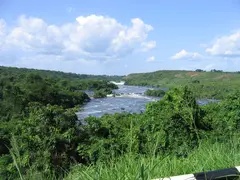
A visit to Uganda with a small Christian charity Afrinspire that I help set up computers for which are sent to Uganda and other African countries. In April people from that charity went to see projects supported in Uganda, and I tagged along to see Africa for the first time. This wasn't a tourist trip - we didn't see gorillas in the mist, or other vistas of nature which I hope to see one day. But we did see Uganda from street level and got to meet Ugandans face to face. It was a real privilege to go there, and be welcomed so warmly by those I met. Excuse an attempt at a stream of consciousness, or perhaps a Nile of consciousness. My memories not a coherent whole. Instead scenes and sights and sounds and smells tastes into my thoughts tumble. Where start I? Above the clouds? Above the sands? Desert plain blank featureless snatches. Yet circles large circles written onto the dry expanse. Signs omens of? On the flight map names legends are displayed - Serengeti, Nile, Lake Victoria. I am being borne towards someone else's world. Masindi. Poor desperately poor village. Red termite mounds and round thatched huts swell in the fields and scrubland. Despite disease and strife they smile true joy. Despite difficulties getting education they're not stupid, they're trying to help each other. Despite (or due to) the poverty they generously press hats and sieving bowls and chickens on us. The chickens foul up (pun jest joke) the back of one of the jeeps on the long way back to Kampala. A slanting line across the road. Circles you can stand in and be photographed. Pretty official looking certificates to buy since crossing equator. Dubious demonstration of water swirling different ways down plugholes north south of line. Sham ebony and rosewood artifacts for sale. Yellow weaver birds ignoring all this and climbing in and out of their nests. The White Nile. Wide waste of tumbling water. Too wide to photograph. Just look at wide-eyed, thinking of Speke. Our soldier escort carries his AK47. The Ugandan army on the cliffs above the bridge. To the north of us somewhere the LRA. Sudan some say. On the way to Karuma Falls we met a military roadblock. Disconcertingly diverted into an army barracks. Before we were allowed to see the falls. My homeland reaches out for me even here. Amid the traffic fume chaos of Kampala Sams restaurant caters for us - the avocado milk shake and crocodile fillet taste. The TV at the Kolping Guest House shows Norwich beating Man Utd as we dine on omelettes. Franco unknowingly plays the song Virginia chose for us to dance to. Katuna Border. The middle of nowhere, neither Uganda nor Rwanda. Beggars haunt one - to give not to give? Large tankers motor on past. Incoherent stories from want-to-be-friends strangers. A strange cartel - the money changers clad in green coats. Up on the roof of the world with mountains quilted by sorghum fields. The stars blaze so bright at midnight, Orion's belt is burnished. A volcano in Rwanda crowned in mist. They stamp out a Rikiga dance in the near dark from a charcoal stove in Guster's house. Words and languages fascinate me, and Uganda was a rich confluence of tongues. English is the common and the official language, but there are forty languages spoken in different areas. I didn't pick much up - one or two words in Swahili (a trade language which originated in contact between Africans and Arab traders.) Swahili is the official language of Kenya (we flew on Kenyan Air) and Tanzania, but not Uganda. It was difficult to find postcards in Uganda (tourism is still an adventure,) one I did find had an elephant on it with 'Jambo' (Swahili for hello.) Thanks is 'Asante', thanks a lot is 'Asante sana' (Os and As sounded rather close to me.) Going around one heard 'Mzungu' a lot (pronounced 'Musungu' means white man), the plural is 'Bazungu'. 'Mzee' (said 'musay') means respected elder. The 'Bakiga' people speak 'Rikiga' (the K here is a "ch" in sound but in Kabale it's a "k".) Two-wheeled vehicles are 'boda-bodas'. I was told 'boda' is a corruption of the English word "border" in the Luganda language, and 'boda-bodas' were used for travelling the "border". We were in the second biggest city in Uganda called Mbarara during an election. A vivid candidate was Lawrence, the 'boda-boda' man, whose campaign centred on how few jobs there are (even Ugandans with jobs often have to moonlight too.) His motivated supporters raced around on motorbikes and the backs of trucks, making their voice heard. Ugandans are less slaves to the clock than we are, perhaps partly due to not all having watches and timepieces? The mountain area (Rwancerere) we stayed in had drums which served to tell the villagers it was time for Church or suchlike, depending on the rhythm beaten out. The school bell was an old car inner wheel, quite melodic. You see old cars and buses in various states of decay around the place. The evening agenda is pre-supper then wash then tea then bed. A necessary hand washing ritual comes before eating with hot water poured over your hands and a bar of soap in the bowl. Water does not come out of taps (one duty of the children is to fetch water from boreholes or dubious springs or bottom of mountains,) and so Ugandans are frugal with using water. I didn't master body washing in a bowl. Hotels etc provide slip-ons to wear in the washrooms. Mental and physical flexibility come in handy for the toilet arrangements. Newspapers are sold stapled (so you know you're getting an unread edition.) Ugandans are a warm people, you can see boys and girls holding hands with each other without it meaning anything more. Handshakes often seemed to involve interlocking the thumbs. Applause in Masindi was clap three times, then clap three times more, then clap again this time ending with sliding one hand off and a high-pitched keening. We got to sign loads of visitor books, listen (and make) speeches, and be entertained by singing and dancing. We were white people, this was formal protocol, they were in many cases acknowledging help given, but I also sensed a Ugandan way of doing things - a way of respecting people we have lost in the West. The singing and dancing was impressive, they all seemed to have a genetic sense of tempo. Especially moving and memorable were the young people at Shuuku Vocational College (a very demanding "Acholi" dance,) and the very different "Batwa" (pygmy) dance. Education particularly vocational education is high on the agenda. Parents want their children to go to school, and the children want to go. The style of teaching is to the West antiquated, and the dormitories at boarding schools can be very cramped, but there is a desire to learn which is the important thing. Equipment and books are in short supply so chemistry may be less practical and more rote learning of "-ate" means an oxygen compound and "-ite" a sulphite one. Christianity is very evident in Uganda, Islam to a lesser extent. Christian slogans on the backs of cars, stores called "Divine Ebenezer Cake Shop", cabinet ministers quite happy to sing hymns in public. Schools are often of a religious foundation, the Church in Uganda performs a real service to the community. It does have challenges like polygamy - this is dealt with pragmatically by controlling the level of integration into the Church. Where there are (some) tarmac roads there are also perilous potholes and savage sleeping policemen. Often it's dirt track (a very rutted one going up the mountains to Rwancerere.) Uganda is very dusty but paradoxically people seem to dress as if they were going to a party. You do see colourful scenes as one drives around from the variegated pyramids of fruit to the schoolchildren like flowering bulbs in an English spring. Primary school children wearing bright primary colours. Kampala is a traffic nightmare with dire air quality and weaving 'matutus' (minibus taxis) and suicidal motorcyclists. Speaking of night don't drive during it - daytime is bad enough with cyclists careering everywhere but at night you get overladen lorries driving without lights to avoid being stopped. Government cars have red licence plates. The law is based on English law. Stones and gates and loofahs and plush armchairs and wood and fruit are piled by the roadside for sale. And coffins too - life expectancy here is in the low thirties, and infant mortality high (children not talked about until 1 year old.) You see a lot of charcoal bags for sale or being transported dangerously on lorries - charcoal is used for cooking and heating in stoves with faces. So much charcoal that the forests are in danger and the government has started forest planting programmes. Even places with electricity have regular power cuts. When night comes in the mountains it is really night - you retreat around the charcoal stove for warmth and the stars blaze forth. Ugandans make their own bricks in hundreds of brick kilns - no planning permission needed here. Buildings range from grass huts through cattle dung and murum (clay?) walls to brick buildings. At least the land is green and many things grow here. No need for the boom irrigation schemes we saw passing over the Libyan desert. Those were the strange circles - vast booms turned by the pressure of water pumped out into the aridness thanks to oil money. Don't come to Uganda if bananas make you bilious. There's at least five different kinds here, ranging from the small yellow ones with a strong flavour to the green ones which get fried (in the leaves) and mashed into the staple matoke. Fruit is plentiful and fresh here - mangoes and papayas and pineapples and oranges (green as they should be.) Beekeeping is popular - there's a belief in some parts that the beeswax at a nest entrance helps against AIDS. Goat meat is on the menu - goats and sheep are herded together and it's difficult to tell them apart. Sheep tails go downwards, goat tails go upwards. Grasshoppers are also on the menu - wished I had a picture of the UFO like spotlight clusters which trapped grasshoppers in nets. One menu had "chaps" on it which proved to be flat battered sausage meat. All in the party had upset stomachs at one stage or other. After my dose I ate sparingly and carefully but I did try the sorghum "porridge". This brown fermented Ugandan male drink is an acquired taste - potent but potently sour. There's a millet "porridge" too (inferior I was told.) Oh and millet bread which is like chestnut stuffing. Africans use hot milk with tea, hot milk rather than water. Everything goes into the kettle making tea a different experience to what teabags give. There weren't many young men in the mountain village we stayed in - away working on the tea plantations. Uganda has a wide range of terrains from rainforest to red desert scrubland to cooler mountain regions. Some of it reminded me of England's green and pleasant land, and it was green and lush (I was there during the wetter half of the year - lying on the equator there's just two seasons a wet and a dry.) When it rains it really pours and thunders. In the mountainous south saw what looked like cacti but were Candelabra trees (Euphorbia candelabrum.) Put that against what they called eggplants which were definitely not aubergines (they did look like eggs.) Or the pumpkin which Pastor Guster auctioned at the end of the service in Rwancerere (more a white gourd.) Many people are subsistence farmers and live without earning or spending - so church collections includes fruit and vegetable which get auctioned as part of the proceedings. As one drives along you will see lots of red bougainvillea, or mauve jacaranda, or white and yellow arum lilies (moon flowers?) grown to attract bees. Or see Hathor-like longhorn cattle grazing by papyrus beds, or glossy sacred ibises, or yellow weaver birds climbing up into their nests, or see the gross Malibu storks scavenging. And you may hear the sibilant whistling thorn trees (I kid you not.) It was the smaller lifeforms I was worried about, and I gratuitously applied eucalyptus based insect repellent and tried to use mosquito nets. Mosquitoes were only really noticeable in the Lake Victoria area, and tsetse flies were further north. I took "malarone" against malaria, and was careful about water used for drinking and cleaning teeth. In passing there are albinos here and their lot is not pleasant. Whether it's genetic, or having no protection against a strong sun, nonetheless they're often blind and disabled. Polio and clubfeet are problems, together with amputation being a simpler treatment if you have poor medical facilities. Uganda is a poor country full of need. What we wouldn't miss from our bank accounts will make a big difference there. We can so easily make a difference to them, support them, give them hope. Going there made me think about aid, the questions to be answered about aid. Why? This is the question to start with, I'm not being jocular. Why give aid? One might give aid because one feels guilty. It'll take more than putting a coin into a tin to erase guilt. One might give aid because sympathy is awakened by a moving picture on the TV. A good why but good also to strengthen and deepen the why of aid by tying to one's core beliefs. If those core beliefs are Christian then one can go right back to the Old Testament for there should be no poor among you, or leave gleanings for the widows and aliens. What to aid? There is a kind of aid which only 'satisfies' the donor. A lot of aid sadly falls into this category. There's palliative aid which improves things - for the short-term. Best is unattractive long-term, low-key aid helping people like the Ugandans help themselves. Ugandans are not stupid, they're trying things like different crops and tree grafting, they're trying to get their communities working together. They'll come up with ideas appropriate for their situation rather than what we might suggest. How to aid? It's difficult to tell from the UK how much good one's donation is really doing. It was a privilege to go, to be part of the party thanked for sewing machines and computers and books and chemistry equipment and plaster of paris and money for corrugated roofs. But in terms of judging where to put aid, how well aid is acting, I would rely on local Ugandans. As a 'msungu' (white man) one cannot but affect what you're observing. There is a real danger of a Potemkin village effect. Or of using aid to buy appreciation. The decisions about where to put aid are almost life and death decisions. That's too close to playing God for me.
24th Nov 2009
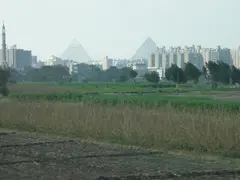
A dirty building site. Unfair but that would be my one sentence summary of Egypt. Most of the country is sand, and the wind blows the sand (and rubbish) everywhere. Half-finished buildings with cement staircases going nowhere are everywhere. Drivers don't worry about such niceties as lanes, or even staying on the road. In a traffic jam vehicles slew randomly off road, across the rough ground beside the road, and force their way back on. Pedestrians dice with death - our coach stopped to help a man who had failed to cross a 5-lane motorway on foot. Sheep and goats destined to die in the Festival travel crammed into the back of tracks. Donkeys pull laden carts to add to the mayhem. By the road vegetable stalls sit well into the night. It was a long long tour from Port Said to Giza for the Pyramids and back. Made longer by the prolonged misguided lecture on Islam we had - I did know of how Islam's founder had revised the Bible to suit the sword he found. Hawkers were nearly everywhere, a constant threat. Despite multiple warnings people still found themselves trying to buy back cameras, or disputing change with wily Arabs. While I could see how poor most of the people were, and understand why they were the way they were, I was very relieved when we had run the gauntlet to get back onto the ship. Our guide was harsh on her own countrymen - their situation is dire, serious overpopulation, widespread poverty, has coloured their existence. I'm not sure if Brits were raised in such conditions that they would not be worse (given that many young Brits rate getting smashed out of their brains as life's goal.) Our goal was to see the Pyramids, and this was achieved. Our first sight was the Pyramids looming over the Giza cityscape, and that strangely was the most impressive. They seemed then alien, like a 2001 monolith or an Independence Day starship, something from beyond. Seen in the traditional view, isolated in a sea of sand they were massive, yes, but just massive. It wasn't possible to stop and think around the pyramids as camel drivers, and postcard vendors, were ready to pounce. The Sphinx was surprisingly small, the normal views one sees are deceptive. We had a stop in a Papyrus shop for a demonstration then sales pester - one such place had the odd title of "Atlantis Papyrus Museum"!
3rd Jun 2012
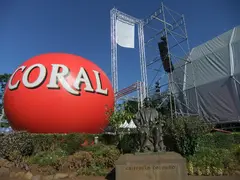
The sun was shining as we walked independently around Funchal in Madeira. Solar power really helps with taking pictures. Truly a garden city, nature blooming. We went as far as Reids Hotel but didn't stop for a coffee there.
6th Nov 2021
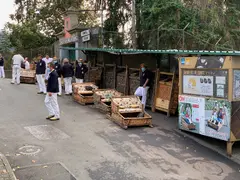
I looked out earlier than usual to admire the prettiness of Funchal as we arrived in port before the sun had awoken. We had ordered breakfast in our room to speed up being ready in time for our very first excursion of the cruise. It arrived as requested at 7am, far too much milk which came in covered glasses like the orange juice did. My oatmeal was more of a milky gruel. We were in plenty of time to board Coach #2 for the Gardens of Madeira. No stickers with our tour number on them to worry about falling off our clothes this excursion. A LCD display above the driver in the coach read "Andrea Bocelli Great", I thought about making a joke that it seemed like a man singing most of the time, but one of my fellow Brits outdid me by in all seriousness saying our driver wasn't very modest. Madeira is very hilly and both we and the coach got plenty of exercise going up and down. On the way to the first stop the Monte Palace gardens we saw the sledges which were once public transport to descend the steep hills, now a tourist experience. Not covered by our cruise insurance. The "Monte Palace" gardens are very eclectic in what they contain. A didactic set of panels on Portuguese history. Replicas of the Terra Cotta warriors. A collection of rocks and minerals. Zimbabwean naive sculptures. Grecian forms. Chinese formal gardens. Very picturesque, and if you managed to get down to the bottom your ticket granted you a free sip of Madeira sweet or dry. Very pretty and photogenic. But a steep climb back to the cafe where Virginia waited for me. I had a black coffee and a very tasty fresh warm custard tart which was melting in my fingers. The Palheiro gardens are much more conventional, more English Stately Home in feel. Our guide, armed with a purple umbrella with pictures of dogs on it, recited the names of the different plants we saw. Sadly her umbrella handle broke. An eclectic (great word that) collection of trees and flowers in the "Palheiro" gardens, our guide told us nature does well in Madeira where the climate stays temperate all year round. The humidity is high which the plants rely on. Another drink and carrot cake and custard tart at the end of the visit before returning to the coach and worrying if we would make it back to the ship before it sailed! We hadn't had a proper lunch so I persuaded Virginia to join me in the ritual of afternoon tea. A female trio played in the background. The waiters displayed the consumables to start with and got applauded. I enjoyed the fruitless scone a kind waiter procured me most. The shops onboard opened at 4:30pm and I was lucky enough to buy a new earphone cable connection without needing a mortgage. The old one died the day before, and I had to cower in the bathroom to watch a movie on the laptop after Virginia had turned in. Hard being a film fan at times.
8th Nov 2021
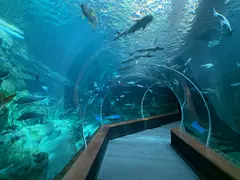
During the night if you look out the lights of the ship reflect off the waves. It is like one is on a ghost ship on the seas of the night. People were already streaming off the ship when we went for breakfast this morning. We left the ship and walked into a bit of Las Palmas. Unlike previous cruises bottles of water haven't been on sale as you depart. Not so much to see around where the ship docked. We investigated the nearby Poema del Mar aquarium which was a little pricey, but nicely done inside and feeling quite new. Pterodactyls overhead, varied fish to see, tunnels of acrylic glass through the tanks. And you exit through a shop. Our German table companions rejoined us this evening, they had got confined to their cabin while the finer points of Passenger Locator Forms were sorted out.
18th Sep 2022
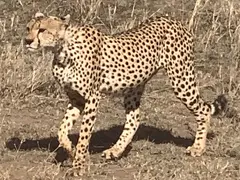
My guide for my safari in Tanzania was named "Good luck", and with that good luck I saw cheetahs and lions and leopards and many things. And heard hyenas laughing at 4am.